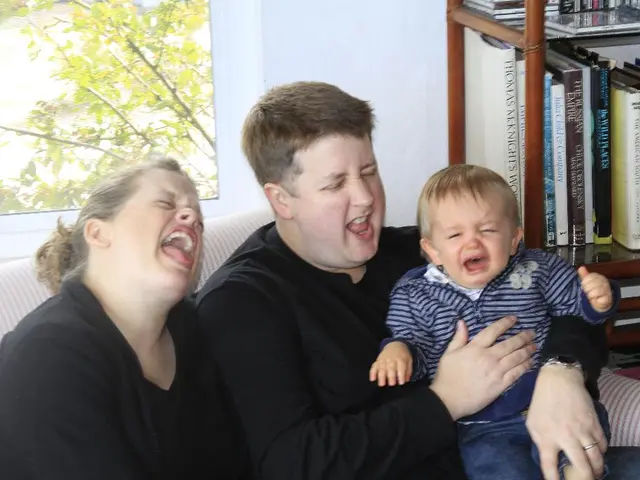Is a Third World War Imminent? The YouGov Survey Implies Yes, Here's the Scoop
- Author: Patrick Roesing
- Estimated Reading Time: 5 min
High Poll Results Suggest Widespread Belief in Possibility of Third Global Conflict - Likelihood of World War III Assessed by Majority of Respondents in Survey
Hail the anniversary of VE Day, dear readers! In a 2025 poll by YouGov, five European countries and the USA shared their thoughts about World War II, assessing the possible onset of a third global conflict.
Bracing for World War III
Across the board, a noticeable percentage of survey respondents think a Third World War within the next five to ten years is likely or extremely likely. The country with the most concern? France, where 55% of the people are worried about another global war.
When asked about potential triggers, the majority of respondents name ongoing tensions with Russia, Islamic terrorism, and, surprisingly, tensions with the USA as potential peace threats.
The Bundeswehr's Capability and Confidence in Defense
Germans themselves express doubt in the Bundeswehr's ability to safeguard the nation during a conflict. Interestingly, the most optimistic views of the German military come from supporters of the SPD, who have Boris Pistorius as their defense minister.
On the flip side, supporters of the AfD and BSW harbor less trust in the Bundeswehr's protective capabilities.
Helping Allies in Times of Trouble
In the case of a hypothetical NATO ally facing an attack, the average across countries suggests that 57% would feel it necessary for their own country to intervene. Notably, this sentiment is strongest in Germany (65%) and the UK.
World War II Reputations and Responsibility
When it comes to acknowledging their country's involvement in WWII, perspectives differ. In the USA, Britain, and France—all allies—approval outweighs disapproval. However, in Germany and Italy, which were part of the Axis Powers, the general sentiment is that the war involvement was wrong, with only 70% of Germans expressing that opinion.
Regarding the responsibility for defeating Nazi Germany, most respondents attribute the victory to the USA, while a majority of Britons see their nation playing a leading role in victory.
Moral Justification of Nuclear Warfare
Notably, the atomic bombings of Hiroshima and Nagasaki left many respondents divided on the morality of their use. On average, 63% of participants answered no when asked if it was morally justified, while 18% found their use justified. Unsurprisingly, Americans were more likely to think the bombings were justified, while Germans ranked among the least supportive.
The Possibility of History Repeating Itself
Almost three quarters of survey respondents, regardless of their country, expect that nuclear weapons would be employed in a potential Third World War.
Peacekeeping Agencies Following World War II
A significant number of Germans attributed the peacekeeping effort in Europe following World War II to NATO, with 38% saying it played a very significant role. Around a quarter of participants mentioned the EU as a primary contributor to peace in Europe, an organization awarded the Nobel Peace Prize in 2012. However, supporters of the AfD disregard the EU's role in maintaining peace, while supporters of the Greens appreciate the EU's efforts the most.
World War II Awareness and Education in Germany
Eight decades since the war's conclusion, the average German is well-informed about World War II and its contexts. More men than women appear to know more about the war. When asked about the importance of teaching World War II in schools, 82% agreed that it should be part of the curriculum; however, this sentiment is significantly lower among AfD supporters, with only 26% considering it crucial.
Methodology:YouGov conducted surveys on the adult resident population of the countries mentioned in April 2025. In Germany, 2,318 people were surveyed between April 4 and 7. In the UK, 1,622 people were surveyed on April 3 and 4. In France, 1,081 people were surveyed between April 4 and 14, in Italy 1,023 people between April 4 and 16, and in Spain 1,051 people between April 4 and 10. In the USA, 1,152 people were surveyed between April 10 and 14.
Insight:As of 2025, a YouGov survey indicates that the prospect of a third world war incites concern globally, with people suggesting potential threats include Russian tensions, Islamic terrorism, and American tensions. Additionally, respondents worry that nuclear weapons will again be employed in future conflicts.
- In the YouGov survey conducted in 2025, the percentage of respondents in France expressing concern about a Third World War within the next five to ten years was the highest among the countries surveyed.
- When asked about potential triggers for a Third World War, the majority of survey respondents named ongoing tensions with Russia, Islamic terrorism, and tensions with the USA as potential peace threats.
- In the case of a hypothetical NATO ally facing an attack, the survey found that the average across countries suggests that 57% of respondents would feel it necessary for their own country to intervene, with the strongest sentiment coming from Germans and Britons.
- Regarding the responsibility for defeating Nazi Germany in World War II, most survey respondents attributed the victory to the USA, while a majority of Britons saw their nation playing a leading role.










